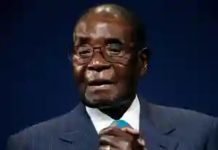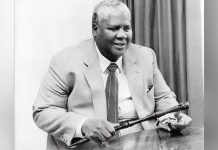LATE former President Robert Mugabe has been removed from the European Union (EU) sanctions list but his widow, Grace remains “restrictive measures”.
Mugabe died September 6 last year, aged 95.
Among top Zimbabwean politicians who remain under sanctions are Vice President Constantino Chiwenga, Agriculture Minister Perrance Shiri and Zimbabwe defence Forces commander General Philip Valerio Sibanda.
They were placed under the 2003 EU travel and asset freeze for their role in suppressing the enjoyment of democracy in Zimbabwe.
EU said, “the existing restrictive measures against four individuals (Grace, Chiwenga, Shiri and Sibanda) are suspended.”
Chiwenga, Shiri and Sibanda had the application of the restrictive measures suspended before – despite remaining on the list. The same now applies for Grace.
According to the Monday statement by EU Council following a meeting Monday, sanctions have been extended for another year on Zimbabwe Defence Industries.
“Taking into account the situation in Zimbabwe, including the yet to be investigated alleged role of the armed and security forces in human rights abuses, the Council today agreed to renew its arms embargo and targeted assets freeze against one company, Zimbabwe Defence Industries, for one year until 20 February 2021,” EU said in a statement Monday.
“The existing restrictive measures against four individuals are suspended.”
“The arms embargo, as well as the asset freeze against Zimbabwe Defence Industries, do not affect the Zimbabwean economy, foreign direct investment, or trade.”
The Council also adopted conclusions on Zimbabwe restating the EU’s continued support for economic and political reforms in the country, as well as for the formal political dialogue, which was resumed in 2019, as a step towards a more constructive EU-Zimbabwe relationship.
“The conclusions note the ongoing acute humanitarian crisis in the country, and renew the EU’s support for the people of Zimbabwe in various sectors, such as economic development, primary health care, resilience building, as well as through humanitarian assistance,” said the statement.
Restrictive measures were initially introduced in February 2002, when the Council expressed grave concern at the situation in Zimbabwe, in particular with regards to serious human rights violations by the country’s government at the time.
The Council conclusions highlight that the EU stands ready to review the whole range of its policies at any time, when justified, based on developments in the country.






